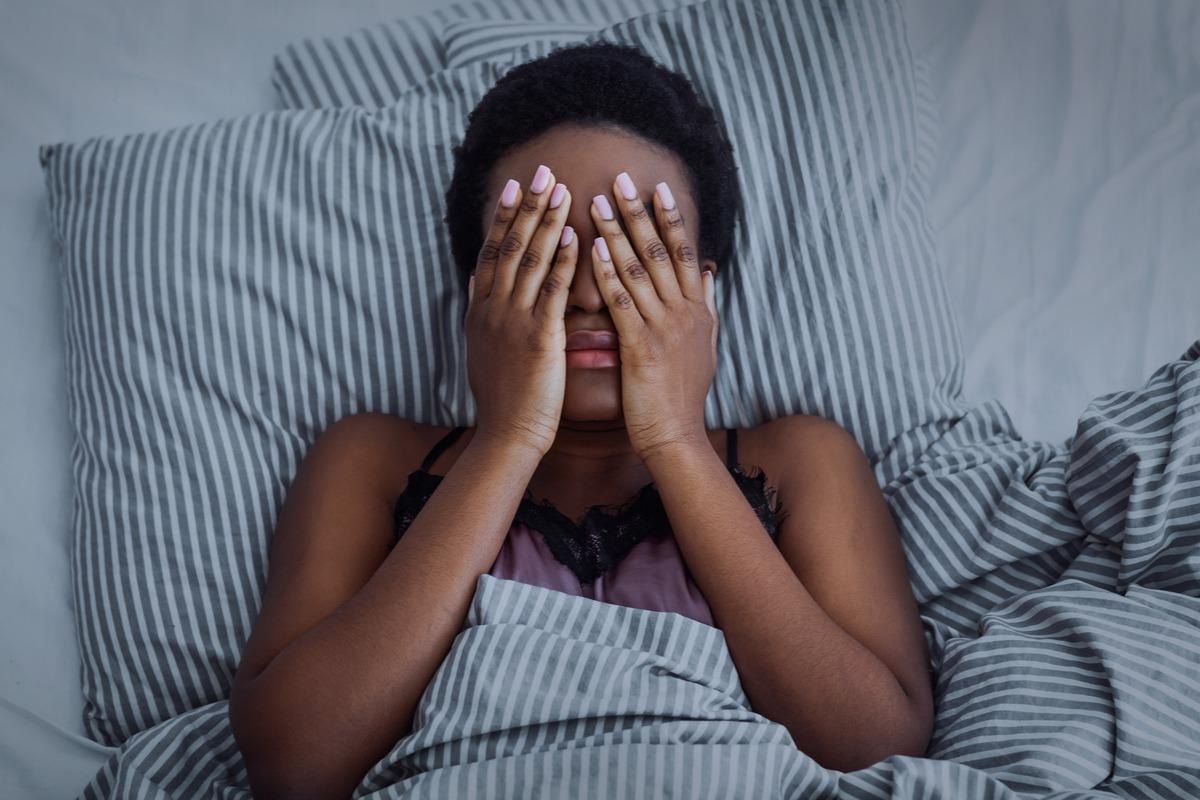In a recent review published in the journal Brain, Behavior, & Immunity – Health, researchers explored the links between coronavirus disease 2019 (COVID-19) and sleep disorders such as insomnia using a thorough literature review.
 Study: How does the COVID-19 fuel insomnia?. Image Credit: Prostock-studio/Shutterstock
Study: How does the COVID-19 fuel insomnia?. Image Credit: Prostock-studio/Shutterstock
Sleep-related conditions like insomnia are the most common health consequences of the COVID-19 pandemic. Terms such as ‘Coronasomnia,’ ‘COVID-somnia,’ or ‘Covidsomnia’ have been reported globally during the monitoring of mental health responses to the pandemic. Many surveys estimate the prevalence of insomnia in individuals affected by COVID-19 as 36.7% globally, 37.6% in Greece, 24.7% in the UK, 19.1% in France, 33.2% in the USA, and 18.9% in China.
About the review
In this review, researchers examined published literature to highlight the link between COVID-19 and insomnia and how the pandemic has increased the prevalence of insomnia.
Many studies showed that women, youngsters, urban residents, and individuals living in insecure livelihoods were more vulnerable to Coronasomnia, a sleeplessness condition caused by multiple stressors and deemed a severe and long-term complication of the pandemic.
According to one study, Google searches for the keyword “insomnia” increased rapidly in 2020 compared to the previous three years in the US. Furthermore, some COVID-19 patients or survivors with chronic diseases experienced long-term insomnia. According to some studies, 38.9% of global healthcare workers had insomnia, and one-third of the medical professionals in China suffered from insomnia during COVID-19.
The British Sleep Society (BSS) reported a negative impact of the pandemic on UK Sleep Services in 2020. According to them, COVID-19-related loneliness, anxiety, and depressive symptoms can all lead to insomnia. The pandemic-induced changes to work, socialization, and human activity and the impact of lockdowns on biological rhythms are significant factors that affect sleep cycles.
In the existing literature, COVID-related insomnia is identified as a mental health issue causing significant psychological burdens in different groups, including COVID-19 patients, medical / healthcare workers working with COVID-19 patients, caretakers, and those in lockdown.
Overall, the findings of the review show that the pandemic has led to an increase in several mental health issues, including anxiety, loneliness, fear, fatigue, and stress. It has also resulted in issues such as social isolation, parenting challenges, juggling work or study, and significant behavioral changes due to home confinement, in addition to financial insecurity and economic challenges. All these factors affect daily routines and significantly impact the three regulatory processes of sleep, namely the circadian rhythm, the homeostatic sleep drive, and the arousal system.
Limitations and future research
The reviewers found that several studies used various sampling methods, criteria, and measurements for insomnia, making it difficult to compare these studies. Many studies had sampling bias, and surveys were mostly dependent on respondent memory and thus may not be accurate. Also, viral transmission and lockdown policies vary widely across regions, and only a few studies account for these factors or other contributors to ‘COVID-Somnia.’
Most of the research on insomnia has been conducted using questionnaires and online surveys to gather data from the first wave of the pandemic. The respondent groups were divided based on their region, age, gender, occupation, and health status. However, there were no studies or surveys on specific populations. More supplement studies will be needed to analyze insomnia in specific populations and the long-term effects of social isolation.
The authors recommend future research focusing on:
1) long-term health impacts of the COVID-19 pandemic,
2) developing therapies and implementing social policies to support people suffering from sleep difficulties,
3) insomnia prevention programs and clinical interventions, and
4) developing national or cross-regional online psychological and sleep management systems to deal with the psychological strain of social isolation and other traumatic experiences linked to the pandemic.
Overall, based on their systematic literature review, the authors conclude that the COVID-19 pandemic will continue to pose long-term health threats collectively called ‘long COVID’, and the pandemic-related lockdowns and stress will be a source of many sleep disorders affecting sleep quality and quantity.
heshmehzangi, A. et al. (2022) "How does the COVID-19 fuel insomnia?", Brain, Behavior, & Immunity – Health, 21, p. 100426. doi: 10.1016/j.bbih.2022.100426. https://www.sciencedirect.com/science/article/pii/S2666354622000163?via%3Dihub
Posted in: Medical Science News | Medical Research News | Disease/Infection News
Tags: Anxiety, Brain, Chronic, Circadian Rhythm, Coronavirus, Coronavirus Disease COVID-19, covid-19, Fatigue, Healthcare, immunity, Insomnia, Mental Health, Pandemic, Parenting, Research, Sleep, Stress

Written by
Susha Cheriyedath
Susha has a Bachelor of Science (B.Sc.) degree in Chemistry and Master of Science (M.Sc) degree in Biochemistry from the University of Calicut, India. She always had a keen interest in medical and health science. As part of her masters degree, she specialized in Biochemistry, with an emphasis on Microbiology, Physiology, Biotechnology, and Nutrition. In her spare time, she loves to cook up a storm in the kitchen with her super-messy baking experiments.
Source: Read Full Article
